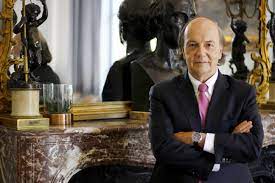Archegos’ Bill Hwang Triggers $30B in Large Stock Sales
“It’s unusual for hedge funds to go over maybe three-to-one, that would be a fairly highly leveraged firm, I don’t know Archegos’ books, but if they were leveraged as what’s being described as ten-to-one, that’s extremely high leverage for equities,” James Rickards, attorney and author of Currency Wars: The Making of the Next Global Crisis, told Blockworks.
key takeaways
- Hwang’s investment firm, Archegos Capital Management, handled around $10 billion in assets and is believed to be the force behind last week’s major sell-off
- Archegos used leverage provided by banks including Nomura Holdings and Credit Suisse Group AG through swaps, according to people familiar with the matter.
- “The first flaw would be that it was spread around a number of different banks and no one bank knew the whole picture, and therefore they didn’t quite understand the leverage,” said James Rickards, attorney and author of Currency Wars: The Making of the Next Global Crisis.
Nine years after pleading guilty to a criminal fraud charge and paying more than $60 million in criminal and civil settlements, Bill Hwang now finds himself at the center of yet another Wall Street scandal.
Hwang’s investment firm, Archegos Capital Management, handled around $10 billion in assets and is believed to be the force behind last week’s major sell-off.
The family office offloaded an estimated amount of around $30 billion in block trades through Goldman Sachs Group Inc. and Morgan Stanley, among others, according to a Wall Street Journal report.
“The first flaw would be that it was spread around a number of different banks and no one bank knew the whole picture, and therefore they didn’t quite understand the leverage,” said James Rickards, attorney and author of Currency Wars: The Making of the Next Global Crisis.
 James Rickards; Source: Wikipedia
James Rickards; Source: Wikipedia“It’s unusual for hedge funds to go over maybe three-to-one, that would be a fairly highly leveraged firm, I don’t know Archegos’ books, but if they were leveraged as what’s being described as ten-to-one, that’s extremely high leverage for equities,” he told Blockworks.
The majority of leverage used by Archegos was provided by banks including Nomura Holdings and Credit Suisse Group AG through swaps, according to people familiar with the matter. This means Archegos likely never actually owned any, or most of, the underlying securities.
Investors with stakes of 5% or more of any US-listed company are required to disclose their position in accordance with US Securities and Exchange Commission regulations. The use of swaps however meant that Hwang was able to remain anonymous, even as he was estimated to have stakes as high as 10% of several companies’ shares.
“Let’s say you acquire 5% of a company, you’d have to file a form 13D, you’d have to tell the world ‘I own a stock,’” said Rickards.
“But the question is, if you own the position, and you own the exposure in derivative form, does that count as stock ownership for purposes of filing these reports? That’s a big deal. Because if it does, you have to file the reports and there is transparency, and if it doesn’t, you can keep building up the position and not file the reports, and that’s what Hwang did.”
Nine stocks made up the majority of selling, including ViacomCBS, Discovery and Chinese-based Tencent Holdings.
ViacomCBS plummeted 27% Friday, a surprising single-day drop for a large-capitalization stock without any company-specific news released. US-listed Chinese video platform IQIYI Inc., also sold in block trades Friday, fell 13%.
History repeats
The margin call brings to mind Long-Term Capital Management’s highly leveraged trading strategy that resulted in a government-arranged bailout in 1998.
“I’m half laughing about it because it was 22 years ago, but it was very hard to do that at the time,” said Rickards, who served in a senior position at the hedge fund and later as its general counsel. He successfully negotiated the $3.6 billion rescue of the firm via the US Federal Reserve.
“It’s highly similar for a few reasons, one, high leverage, two the use of derivatives and three, a large group of dealers,” he said.
Long-Term Capital’s highly leveraged positions were primed to expose some of the largest banks in America to around $1.3 trillion in default risks. It was a different situation, Rickards said.
“But Long-Term Capital was so big, with so many dealers, that the process I described could not have been done in anything close to an orderly basis. In other words, it wasn’t as though Bill Hwang was sitting there on Friday saying ‘hey, guys, let’s all coordinate our sales,’ That’s not what happened. This is much more of a fire drill, it’s kind of everyone running out of the building at the same time.”
In the case of Archegos, the positions were large, and the losses will be, too, Rickards said, but they will not be so large that the banks will be threatened.
“I haven’t seen or heard any reports that said any particular bank is going out of business, or that we’re back to 2008, or anything of the kind,” said Rickards. “It’s big losses, a bad day on the Street, but something that you can survive. That was not true with Long-Term Capital.”
Latest setback
The Archegos episode is only Hwang’s latest public setback. The former Tiger Asia founder pleaded guilty to a wire-fraud charge back in 2012.
Hwang started the hedge fund in 2001 following his time as a “tiger cub,” a term used to refer to those who trained under hedge fund titan Julian Robertson. Tiger Asia grew to a multi billion dollar fund, one of the largest investors in Asian markets.
In December 2012, Hwang admitted that the hedge fund illegally used insider information to profit on trades at least three times. After settling civil and criminal lawsuits, Hwang renamed Tiger Asia to Archegos, according to its website.





